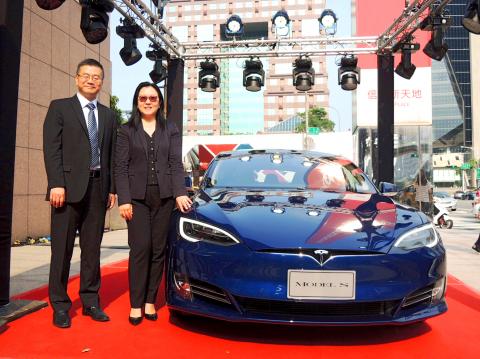Tesla Motors Inc yesterday opened its first showroom in Taipei, making Taiwan its sixth market in the Asia-Pacific region.
The US company said it plans to establish a service center and increase the number of charging stations in Taiwan in the near future.
“I see a huge opportunity in Taiwan’s market,” Tesla global vice president Robin Ren (任宇翔) told a news conference, citing the government’s support for electric car development and a growing demand by customers for fuel-efficient and environmentally friendly driving.

Photo: Yang Ya-min, Taipei Times
Customers can pre-order Model S cars on Tesla’s Taiwan Web site, with the first delivery expected in the first quarter of next year, the company said.
Model S, which can go from zero to 100kph in 2.7 seconds, has a starting price of NT$3.06 million (US$96,420), it said.
Tesla’s factory in California can produce 2,000 vehicles per week, Ren said, adding that capacity will be increased following the delivery of Model S cars in Taiwan.
The company hopes to install more charging stations at Shin Kong Mitsukoshi Department Store (新光三越百貨) branches, in addition to the 400 charging stations already in Taiwan, Tesla’s Taiwan and Hong Kong director Isabel Fan (范菁怡) said.
The company also plans to build charging stations near schools and on highways to offer drivers a better charging network, Fan said, without giving a clear schedule for the expansion.
Tesla’s presence in Taiwan is likely to benefit the local manufacturers in its supply chain, including electric-vehicle harness maker BizLink Holding Inc (貿聯), automative gear maker Hota Industrial Manufacturing Co (和大工業) and power system management supplier Delta Electronics Inc (台達電).
BizLink, which is optimistic about its sales outlook for the second half of this year on the back of shipments of Model S, yesterday saw its shares fall NT$1.5 to close at NT$184.5 in Taipei trading, Taiwan Stock Exchange data showed.

LIMITED MEASURES: The proposed restrictions on Chinese chip exports are weaker than previously considered, following lobbying by major US firms, sources said US President Joe Biden’s administration is weighing additional curbs on sales of semiconductor equipment and artificial intelligence (AI) memory chips to China that would escalate the US crackdown on Beijing’s tech ambitions, but stop short of some stricter measures previously considered, said sources familiar with the matter. The restrictions could be unveiled as soon as next week, said the sources, who emphasized that the timing and contours of the rules have changed several times, and that nothing is final until they are published. The measures follow months of deliberations by US officials, negotiations with allies in Japan and the Netherlands, and

Qualcomm Inc’s interest in pursuing an acquisition of Intel Corp has cooled, people familiar with the matter said, upending what would have likely been one of the largest technology deals of all time. The complexities associated with acquiring all of Intel has made a deal less attractive to Qualcomm, said some of the people, asking not to be identified discussing confidential matters. It is always possible Qualcomm looks at pieces of Intel instead or rekindles its interest later, they added. Representatives for Qualcomm and Intel declined to comment. Qualcomm made a preliminary approach to Intel on a possible takeover, Bloomberg News and other media

Foxconn Technology Group (富士康科技集團) yesterday said it expects any impact of new tariffs from US president-elect Donald Trump to hit the company less than its rivals, citing its global manufacturing footprint. Young Liu (劉揚偉), chairman of the contract manufacturer and key Apple Inc supplier, told reporters after a forum in Taipei that it saw the primary impact of any fresh tariffs falling on its clients because its business model is based on contract manufacturing. “Clients may decide to shift production locations, but looking at Foxconn’s global footprint, we are ahead. As a result, the impact on us is likely smaller compared to

‘NO WINNER’: Experts said that Mexico’s and Canada’s ability to walk away from the threats Trump made is limited, while some tariffs on China are likely to go into effect US president-elect Donald Trump on Monday said he intends to impose sweeping tariffs on goods from Mexico, Canada and China, prompting a swift warning from Beijing that “no one will win a trade war.” In a series of posts on Truth Social, Trump vowed to hit some of the US’ largest trading partners with duties on all goods entering the country. “On January 20th, as one of my many first Executive Orders, I will sign all necessary documents to charge Mexico and Canada a 25 percent tariff on ALL products coming into the United States,” he wrote. In another post, Trump said he